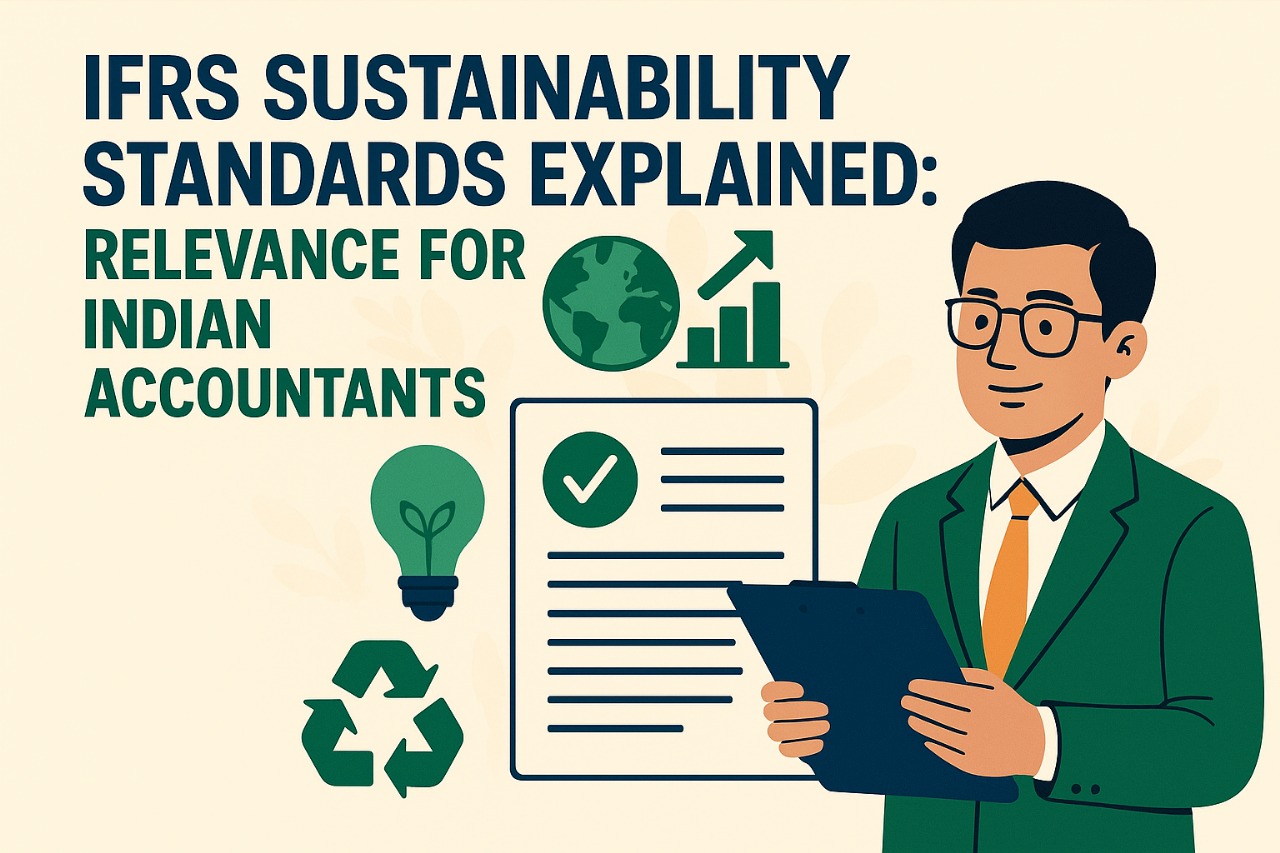Introduction
In 2025, IFRS Sustainability Standards are becoming a global benchmark for transparent and trustworthy ESG reporting. For Indian accountants and finance professionals, these standards aren’t just a global best practice they’re a career-defining opportunity.
In this article, you’ll learn:
- What IFRS S1 and S2 standards mean
- How India is aligning through BRSR
- Why this matters for your career growth
- How the Fintelligents sustainability course can help you lead the ESG transformation
1. What Are IFRS Sustainability Standards?
The International Sustainability Standards Board (ISSB), under IFRS, introduced two key sustainability disclosure standards:
- IFRS S1 – General Sustainability Disclosures
- IFRS S2 – Climate-related Disclosures
Why This Matters in 2025
Stakeholders, investors, regulators, lenders demand reliable ESG data. These standards raise ESG disclosures to the same level of discipline as financial reporting.
2. IFRS S1 & S2 Explained
| Standard | Focus Area | Key Disclosures |
|---|---|---|
| S1 | General ESG practices | Governance, risk management, metrics, and performance |
| S2 | Climate-specific issues | Emissions, targets, climate resilience, transition plans |
Highlights:
- IFRS S1 sets overarching ESG principles like materiality, risk, and governance.
- IFRS S2 focuses deeply on climate risks, including GHG emissions and scenario planning.
3. ESG Reporting in India: Where We Stand
India has been making strong moves in sustainability reporting through:
- SEBI’s BRSR: Mandatory for top-1,000 listed companies.
- Corporate readiness: ESG frameworks, reporting systems, and auditor upskilling are underway.
- Overlap with IFRS: BRSR aligns with many aspects of IFRS S1 and S2, making India well-positioned for global alignment.
Global ESG Standards vs Indian Laws
| Feature | BRSR (India) | IFRS S1 & S2 (Global) |
|---|---|---|
| Scope | Governance, CSR, environmental & social indicators | Financially material ESG + climate impact |
| Detail Level | General compliance | In-depth climate risk analysis |
| Regulator | SEBI | ISSB (via IFRS Foundation) |
Fintelligents’ course explains how to bridge these frameworks and support seamless implementation for Indian firms.
4. Why Indian Accountants Must Act Now
Compliance & Advisory Readiness
- Corporates need help navigating BRSR + IFRS frameworks.
- Dual-competency professionals will be in high demand.
Career Boost
- ESG disclosure is premium expertise for Indian CAs and FRMs.
- International relevance for those working with multinationals or global audits.
5. Fintelligents ESG & Risk Programs: Build Future-Ready Finance Skills
Fintelligents empowers Indian finance professionals with globally recognized credentials that support ESG integration, climate risk analysis, and sustainability-focused decision-making.
Explore Our Flagship Programs:
- CFA Institute Certificate in ESG Investing – Learn to analyze and integrate ESG factors in investment processes
- FRM (Financial Risk Manager) – Develop capabilities to manage financial and climate-related risks
- SCR (Sustainability and Climate Risk) by GARP – Gain expertise in climate risk frameworks and disclosure standards
You’ll Gain Skills In:
- Applying IFRS-aligned ESG frameworks within risk, audit, and advisory roles
- Conducting climate-risk assessments and scenario modeling
- Interpreting materiality and sustainability data for informed reporting and investment decisions
Whether you’re a CA, CFA candidate, or risk professional, these programs help you lead in the era of sustainability-driven finance.
6. Roadmap for Adoption in India
Here’s a five-step path to IFRS-aligned sustainability reporting:
- Map overlaps between BRSR and IFRS S1/S2
- Conduct gap analysis in existing ESG reports
- Upgrade data systems for emissions and risk metrics
- Train internal teams on ESG judgment and compliance
- Run pilot disclosures with IFRS frameworks
7. Career Impact: Future-Ready ESG Skills
Top in-demand skills from the Fintelligents Sustainability Course include:
- Materiality Assessment
- Climate Risk Modeling
- ESG Assurance Readiness
- Integrated Report Design
Ideal for:
- Chartered Accountants (CAs)
- ESG Consultants
- Auditors and Risk Analysts
- CFA/FRM-qualified professionals
Conclusion: Lead India’s ESG Transformation
The global pivot to Sustainability Reporting Standards is irreversible, and Indian professionals are poised to lead.
With the convergence of IFRS S1 & S2 and India’s own BRSR, there’s no better time to future-proof your career.
FAQ
Q1: What’s the key difference between BRSR and IFRS S2?
A: BRSR covers broad ESG themes; IFRS S2 provides detailed climate-risk disclosures like emissions and transition plans.
Q2: When will IFRS Sustainability Standards take effect in India?
A: Global standards are live. India is expected to phase in alignment through 2025–26, particularly for large listed entities.
Q3: Who should take the Fintelligents course?
A: CAs, auditors, CFAs, FRMs, ESG advisors, and finance professionals ready to lead in sustainability reporting.
Q4: How will IFRS knowledge benefit my career?
A: You’ll gain ESG advisory expertise, support corporate compliance, and unlock global roles in sustainable finance.

